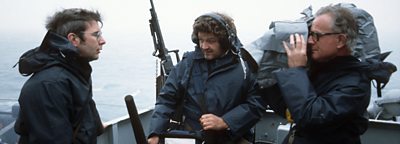Image: Brian Hanrahan reporting on board HMS Hermes during the Falklands War, May 1982.
Not since Suez had Britain mobilised such an invasion force, and the BBC recognised early on the potential for a public spat if it was put under pressure to support the campaign in the way it had been pressured to support the 1956 offensive.
And a spat there was. Initially the problem was over the tone of the BBC's reporting of the combat, and particularly its presentation of information issued by the military. Peter Snow, on Newsnight, began one sentence: "If we believe the British...". Casting such doubt on official sources enraged the Thatcher Government, and John Page MP described Snow's remarks as "almost treasonable".
Sir Ian Trethowan, Director-General at the time, argued that the BBC had to "guard its reputation for telling the truth".
A week later the BBC broadcast an edition of Panorama under the title "Can We Avoid War?". It was, said one former Cabinet minister, "one of the most despicable programmes it has ever been my misfortune to witness", and another described it as an "odious, subversive travesty". There were misgivings about the programme inside the BBC too. Presenter Robert Kee told The Times it had been one-sided. He was promptly dropped from Panorama, and resigned from the BBC later that month.
Seeking to bring the sides together, Home Secretary William Whitelaw arranged for BBC Chairman Lord Howard and the Managing Director of Television Alasdair Milne (in place of Trethowan, who was abroad) to meet Conservative backbenchers in a committee room at Westminster. More than 100 Tory MPs turned out to berate the two BBC men in an undignified shouting match.
However, the showdown effectively lanced the boil. Over the following days it became apparent that the military campaign would succeed and, as tension over the conflict ebbed, so pressure on the BBC began to ease.
During the rumpus the BBC had been tough in its own defence, declaring, for example, that "it is not the BBC's role to boost British troops' morale", and that "the widow in Portsmouth is no different from the widow of Buenos Aires". But Director-General Trethowan reflected later to news and current affairs executives that they had to be "sensitive to the emotional sensibilities of the public".
